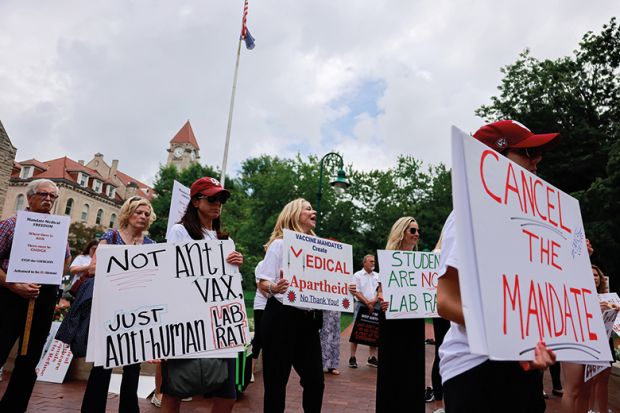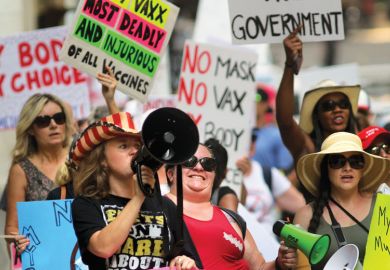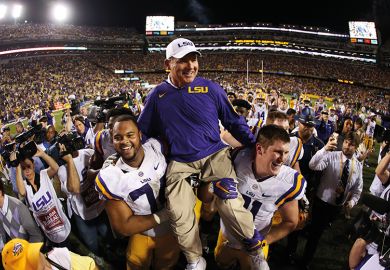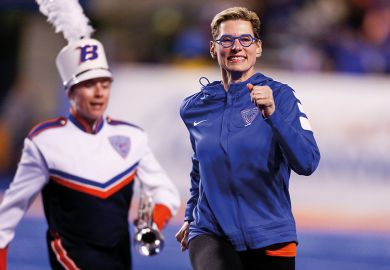Indiana University’s just-retired president, Michael McRobbie, sees his success in enacting a vaccine mandate as showing a possible path forward for US higher education leaders stymied by the nation’s wide partisan divide.
Professor McRobbie stepped down this summer after 14 years leading the flagship university in one of the nation’s most politically conservative states, just before a first-in-the-nation court ruling upheld his mandate.
In an interview, Professor McRobbie acknowledged the fierce opposition that such Covid vaccine requirements have generated in Indiana and other conservative parts of the US. However, he said he spent years cultivating relationships with lawmakers that have helped defuse animosities.
“It certainly takes effort, and you certainly have to keep at it,” said Professor McRobbie, a native of Australia who spent 24 years in senior leadership positions at Indiana.
Yet some other university leaders across the US, despite determined efforts, have not been so fortunate in pushing back a rising tide of partisan fighting and conservative rejection of scientific expertise.
They include W. Joseph King, who resigned last month as president of Lyon College in Arkansas, and Rick MacLennan, who faces imminent dismissal as president of North Idaho College, both under ideological pressure from the conservative communities around them. F. King Alexander left the presidency of Louisiana State University under similar circumstances in 2019.
Professor McRobbie credited his long tenure – more than twice the average for US university presidents, and in a state that voted overwhelmingly for Donald Trump in the 2020 election – to strategies that included wide consultation with consistent emphasis on the institutional mission.
The university’s battle to require Covid vaccinations for all students, faculty and staff was ultimately decided in federal court rulings. But the state’s Republican governor and lawmakers, after some emphatic criticisms, ultimately backed away from threats to keep fighting it.
Professor McRobbie said he laid the groundwork by creating panels of top medical experts at the university who met regularly to set out approaches and rationales for handling the pandemic. It was part of a broader pattern of engaging directly with lawmakers, trustees and other potential critics on looming controversies, he told Times Higher Education.
“You can’t ignore them,” he said of state lawmakers. “And, in fact, just the opposite – it makes a lot of sense to be able to seriously embrace them, work with them and try and make them understand what you’re trying to achieve, and then at the same time, try to understand what concerns they have. Because I think they have legitimate concerns from time to time.”
Some US university leaders, however, have encountered especially antagonistic governing boards, often appointed by state governors and lawmakers with agendas reflecting a nationwide trend of prioritising partisanship.
Dr MacLennan is facing that at North Idaho, where the board blocked his attempt at a campus-wide mask mandate. This year’s most notorious case is likely the board at the University of North Carolina at Chapel Hill, which lost Pulitzer Prize winner Nikole Hannah-Jones as a journalism professor by repeatedly refusing to confirm her tenured appointment.
“I suppose I was lucky and grateful that I had trustees who on the whole understood the mission of the university,” Professor McRobbie said. “They might have very different views about exactly what direction we should go and priorities and things like that, but we were always able to agree on a common purpose and a common direction.”
One bigger-picture insight that may have underpinned that success, Professor McRobbie said, was a $200 million (£140 million) “grand challenges” programme aimed at Indiana’s poorer communities. It involves university leaders visiting such areas of the state to point out major problems needing attention and hearing the thoughts of local residents on what should be done about them.
That’s led to dedicated research efforts on matters that include adapting to climate change and combating drug addiction, he said.
Others have tried similar things elsewhere. They include Marlene Tromp, the president of Boise State University, who, like Dr MacLennan, has felt Idaho’s political pressure and sense of alienation from higher education. In response, she has created outposts in small Idaho towns where students get online instruction boosted by faculty stationed locally to help them.
The effort at Indiana has “been very successful for us”, Professor McRobbie said. “The whole goal is: how can the university help the left-behind communities – whether it’s economically left behind or left behind racially.”
In retirement, Professor McRobbie is not leaving Bloomington. The trustees gave him the honorary title of university chancellor – just the third such instance in Indiana’s history – and he expects to keep working in areas that include cultivating donors.
And just two months after departing the Indiana presidency, he found himself speaking bluntly about his victory on vaccines and the general problem of conservative states blocking basic public health measures.
There is little reason, he wrote in Science magazine, “for the political hue of a state to deter universities, as citadels of science and reason, from making every attempt to implement vaccine mandates”.
POSTSCRIPT:
Print headline: Newly retired Indiana president sees path out of partisan division
Register to continue
Why register?
- Registration is free and only takes a moment
- Once registered, you can read 3 articles a month
- Sign up for our newsletter
Subscribe
Or subscribe for unlimited access to:
- Unlimited access to news, views, insights & reviews
- Digital editions
- Digital access to THE’s university and college rankings analysis
Already registered or a current subscriber? Login








